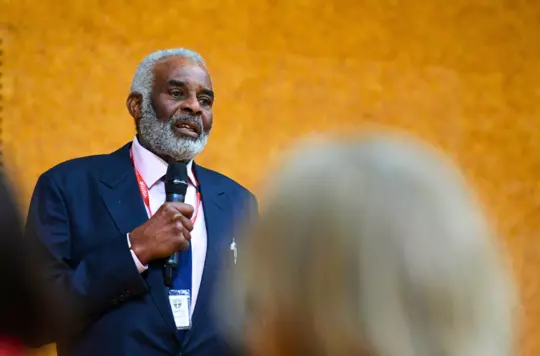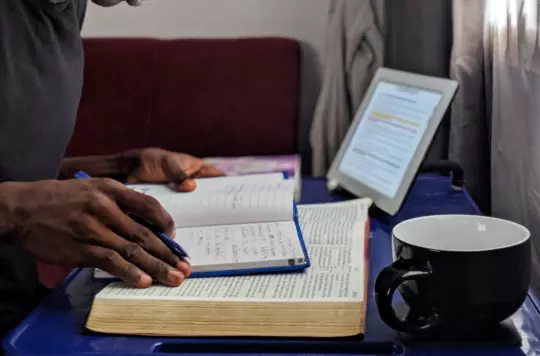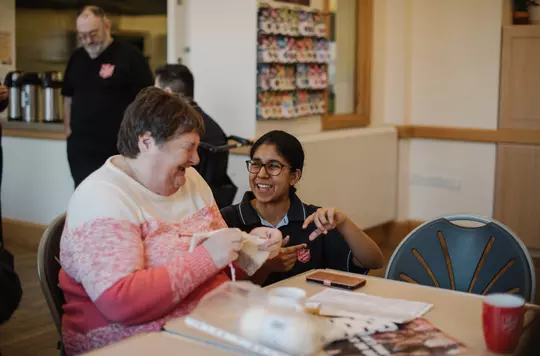1 May 2023
Do you feel comforted by God?
Captain Vanessa Coleman
Captain Vanessa Coleman encourages us to focus on God’s unfailing love.
Key text
How often do you get the opportunity to hold hands with anyone – the trusting grip of small chubby fingers, the nervous tingle of a new love, the comfort of an old friend? Special connections happen in those moments of physical touch.
In his Enduring Words commentary, David Guzik writes of Psalm 119: ‘The sections and verses are not like a chain where one link is connected to the other but like a string of pearls where each pearl has equal, but independent value.’
The section entitled ‘Yodh’ is the 10th pearl in the psalm’s necklace. For Jewish people, the number 10 has special significance, celebrating the perfection, completeness and unfailing love of God. Throughout this psalm, letters representing the different ‘pearls’ give context and meaning to the verses that follow. The letter yodh (י) is not only a placeholder, a number and a sound but also means ‘arm’ or ‘hand’.
Our verses begin with a reminder that we are ‘formed’ by God’s hands – hands that we can trust to be strong, good, powerful and loving. We begin by knowing that we are held.
Pause and reflect
- When are you most in danger of forgetting that God holds you?
It is this tiny letter of the Hebrew alphabet that Jesus is referencing in Matthew 5:18 – ‘Truly I tell you, until Heaven and Earth disappear, not the smallest letter, not the least stroke of a pen, will by any means disappear from the Law until everything is accomplished.’
In the King James Version, the words ‘smallest letter’ are translated as ‘one jot’. Yodh (י) is crucial to the Hebrew language. This letter is the essential pearl in the necklace of Psalm 119 that highlights the unfailing love of God and the comfort that brings.
When this psalm was written, God’s people were surrounded by nations that worshipped gods who were believed to be fickle and dangerous and whose attention was best avoided. There was no thought of love coming from such gods.
Pause and reflect
- How might taking the love and goodness of God for granted have consequences for many in our communities?
In Celtic Daily Prayer, William Broderick writes: ‘Once you’ve heard a child cry out to Heaven for help, and go unanswered, nothing’s ever the same again. Nothing. Even God changes. But there is a healing hand at work that cannot be deflected from its purpose. I just can’t make sense of it, other than to cry. Those tears are part of what it is to be a monk.’ (We might also add ‘disciple’ or ‘Salvationist’.)
‘Out there, in the world, it can be very cold,’ Broderick adds. ‘It seems to be about luck, good and bad, and the distribution is absurd. We have to be candles, burning between hope and despair, faith and doubt, life and death, all the opposites.’
Pause and reflect
- Who in your community and sphere of influence has no sense of love and goodness in their lives?
- What might it look like to burn a candle of hope for them this week?
The verses in our study passage are rooted in the certainty that God wants to be known and understood by us. He wants to share his heart with us. The psalmist’s desire is to deepen his relationship with the Lord.
He declares his intent to ‘learn your commands … put my hope in your word … meditate on your precepts … understand your statutes … wholeheartedly follow your decrees’. He does not see the Lord as a dictator on a power trip, bossing people around. Rather, the Lord offers compassionate wisdom and invites us to make good choices, leading to fullness of life and not disaster.
It is in surrounding ourselves with God’s words that we reassure ourselves of his love, goodness, power, truth and trustworthiness. When it feels as though all the evidence is to the contrary, we can offer up our hands to God in a plea for his help. We can remember that he formed us. We can recall that he holds us in his almighty, good and caring hands.
Pause and reflect
- Take a moment to imagine yourself somewhere safe and comfortable. Picture yourself being held in the hands and arms of God, who is loving and powerful. What feelings come to you?
- Breathe deeply and take time for any uncomfortable questions or emotions to rise to the surface and let them settle there and be held in the goodness of God.
Sometimes, we might feel as though we are losing sight of the comfort of God’s unfailing love. Consider memorising the following as a prayer: ‘Let your compassion come to me that I may live, for your Law is my delight’ (v77).
From this perspective, even afflictions can be seen as God’s faithfulness at work. To understand them as opportunities for God’s goodness to manifest itself is a tall order, not of grim determination but of positioning ourselves to receive a new perspective straight from God’s hands.
‘Now comfort me so I can live, really live; your revelation is the tune I dance to... And let me live whole and holy, soul and body, so I can always walk with my head held high’ (vv77–80 The Message).
Bible study by

Captain Vanessa Coleman
Divisional Youth Team Leader, Central, Southern and Channel Islands
Discover more

Neville Lawrence tells Sarah Olowofoyeku how he found peace following his son Stephen's murder.

This Open Learning course explores the psalms of the Old Testament to prompt reflection on Christian life and support practical ministry.

Secretary for Mission Lieut-Colonel Drew McCombe tells Salvationist about the territory’s new research into membership.

